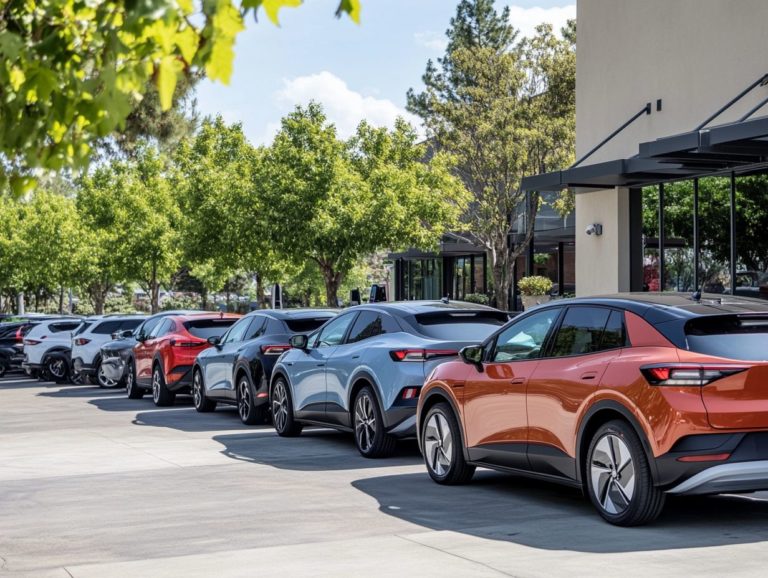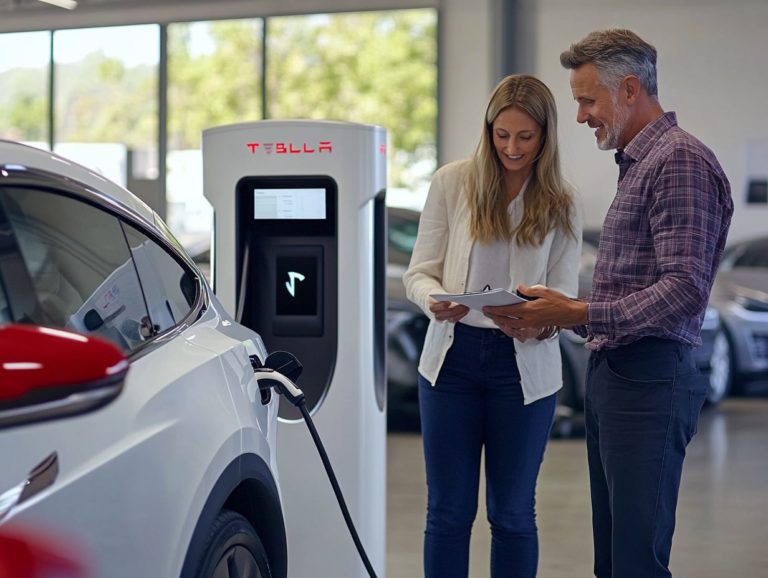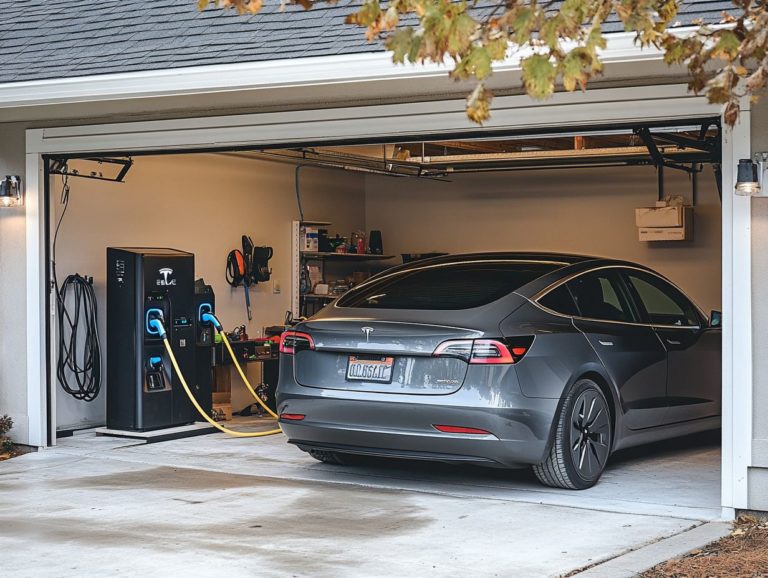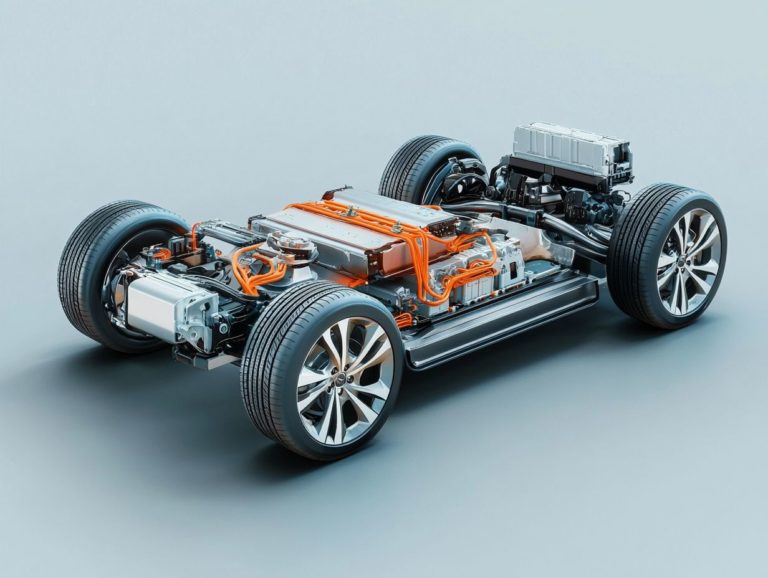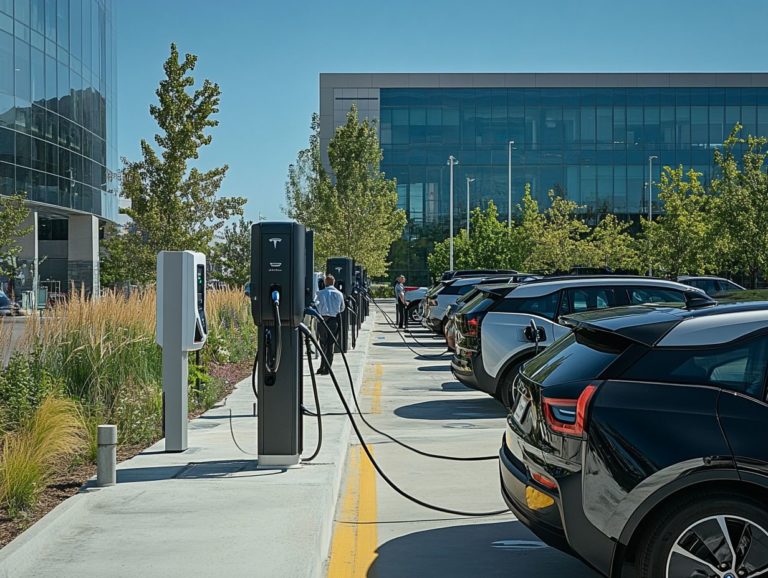how long do electric vehicle batteries last?
Electric vehicle batteries are the driving force behind the EV revolution, shaping performance and sustainability. Prepare to unlock essential insights that will keep your electric vehicle performing at its best!
Contents
- Key Takeaways:
- Overview of Electric Vehicle Batteries
- Factors Affecting Battery Lifespan
- Expected Lifespan of Electric Vehicle Batteries
- Maximizing Battery Lifespan
- Replacing Electric Vehicle Batteries
- Frequently Asked Questions
- How long do electric vehicle batteries last?
- What affects how long an electric vehicle battery lasts?
- Can you extend how long an electric vehicle battery lasts?
- Do electric vehicle batteries need to be replaced?
- How much does it cost to replace an electric vehicle battery?
- Can an electric vehicle battery be recycled?
Key Takeaways:

- Electric vehicle batteries typically last for 8-10 years.
- Extreme temperatures can impact battery lifespan.
- Regular maintenance, such as avoiding frequent fast charging, helps extend battery life.
Overview of Electric Vehicle Batteries
Electric vehicle (EV) batteries play an important role in the automotive scene, affecting performance and sustainability.
These lithium-ion batteries influence battery life, efficiency, and the amount of energy they can store in a small space. These factors are crucial for consumer preferences in the expanding electric vehicle market.
As battery technology advances, manufacturers like Tesla, Ford, and Volkswagen are investing in innovative energy storage solutions. They aim to boost battery capacity and lifespan while tackling challenges related to battery recycling and management.
Types of Batteries Used in Electric Vehicles
Electric vehicles primarily rely on lithium-ion batteries, and it’s easy to see why. These batteries offer high energy density and efficient charge cycles, making them ideal for popular models like the Tesla Model S, Nissan LEAF, Chevrolet Bolt, and Hyundai Kona.
They provide significant advantages, including longer lifespans and lighter weights compared to alternatives like nickel-metal hydride (NiMH) batteries, once the go-to choice for older hybrids.
While NiMH batteries have merits, such as better performance in extreme temperatures, lithium-ion technology excels with faster recharging capabilities and a more compact design.
The adoption of lithium-ion batteries in modern electric vehicles showcases the latest advancements in technology, enhancing driving range, vehicle performance, and overall efficiency across a variety of models.
Factors Affecting Battery Lifespan
The lifespan of electric vehicle batteries is influenced by multiple factors, such as charge and discharge cycles, heat generated from battery usage, and careful battery management practices.
Understanding these factors helps you get the most out of your battery while minimizing performance degradation.
Environmental Factors

Temperature fluctuations and humidity levels can profoundly affect battery degradation, reducing efficiency and lifespan.
Understanding how these conditions influence performance is crucial for maximizing your investment in electric vehicles. For instance, extreme heat can speed up chemical reactions in the battery, potentially causing overheating and irreversible damage.
Conversely, extremely cold temperatures can impede the battery’s ability to deliver power, resulting in a decreased driving range. Store your vehicle in a controlled climate whenever possible.
Regular maintenance checks can enhance battery health, ensuring optimal performance regardless of the climate.
For more information on maintaining your electric vehicle battery or to learn more about electric vehicles, take the next step today!
Driving Habits and Maintenance
Your driving habits significantly impact your electric vehicle s battery health. Aggressive acceleration and frequent fast charging can degrade its performance over time.
These driving behaviors not only drain the battery faster but can also reduce its lifespan. Adopting smoother driving patterns and utilizing eco-driving modes, which help save energy by optimizing how you drive, can greatly enhance battery longevity.
Regular maintenance practices, such as monitoring tire pressure and ensuring proper coolant levels, play a crucial role in optimizing battery function. Implement smart charging techniques, such as avoiding charging to full capacity or allowing the battery to drain too low, to positively affect charge cycles and improve battery performance.
Understanding these dynamics gives you the power to make informed decisions, ultimately boosting your electric vehicle’s efficiency.
Expected Lifespan of Electric Vehicle Batteries
The expected lifespan of electric vehicle batteries generally falls between 8 and 15 years. This range hinges on several factors, including the battery’s chemistry, your driving patterns, and your maintenance practices.
Each of these elements can significantly impact battery performance and shape consumer preferences.
Average Lifespan of Different Battery Types
Lithium-ion batteries, found in electric vehicles like the Tesla Model S and Nissan LEAF, generally boast a longer lifespan than nickel-hydride batteries, making them the go-to choice for manufacturers.
With lifespans typically ranging from 10 to 15 years, lithium-ion batteries can boost the overall durability and performance of electric vehicles. In contrast, nickel-hydride batteries, often found in older hybrid models, usually last around 6 to 8 years.
This difference in longevity doesn t just impact maintenance costs; it also plays a pivotal role in your decision-making as a consumer. If you’re considering a long-term investment in a sustainable vehicle, you’re likely to gravitate toward options featuring lithium-ion technology, thanks to their superior ability to hold a charge and perform well over extended use.
These advancements can give you longer driving ranges, making your daily travels even more enjoyable!
Maximizing Battery Lifespan
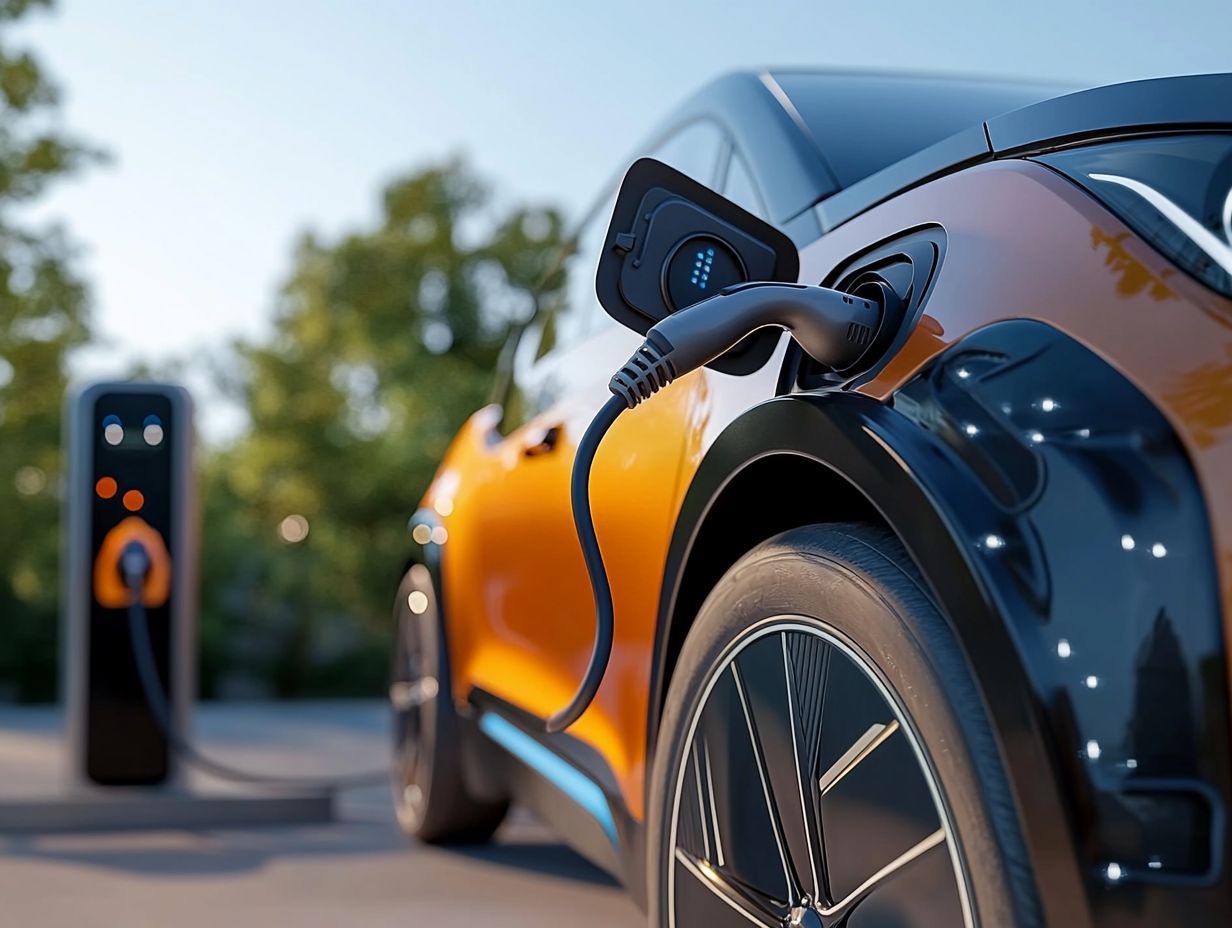
Maximizing the lifespan of electric vehicle batteries requires you to adopt best practices in battery maintenance. This includes employing smart charging techniques and regularly monitoring battery health to ensure optimal performance throughout the years.
By doing so, you enhance your vehicle’s efficiency and extend the life of your investment.
Tips for Extending Battery Life
To extend the life of your electric vehicle battery, embrace certain practices. Steering clear of extreme temperatures, optimizing your charge cycles, and engaging in regular battery maintenance can make a significant difference.
By being mindful of your driving habits, you greatly enhance battery longevity. For example, gentle acceleration and deceleration improve safety and minimize stress on the battery.
Charging your vehicle when the battery is between 20% and 80% is another smart move; frequent full discharges or overcharging can shorten its lifespan. Proper thermal management is vital as well.
Parking in shaded areas during hot weather or in garages during colder temperatures helps mitigate fluctuations that can lead to battery degradation. By adopting these strategies, you can ensure more effective and durable battery performance for your electric vehicle.
Replacing Electric Vehicle Batteries
Replacing electric vehicle batteries is a crucial consideration for vehicle owners. You’ll need to weigh various factors, including costs, warranty replacements, and the overall performance of the battery packs offered by manufacturers.
Each decision you make in this regard can significantly impact your driving experience and investment.
Start implementing these tips today! Your electric vehicle deserves the best care.
Costs and Considerations
The costs associated with electric vehicle battery replacement can vary significantly, influenced by factors such as battery type, vehicle model, and any warranty replacements that manufacturers might offer.
For example, if you re dealing with lithium-ion batteries those trusty components found in most modern electric vehicles you might face replacement costs ranging from $5,000 to $15,000. This range largely depends on your specific car’s specifications and the manufacturer’s pricing structures.
Some automakers sweeten the deal by providing extended warranties that may cover battery replacements. These details can play a pivotal role in your decision-making process when selecting a vehicle. Understanding the details of these warranties is essential, as they can ease some financial burdens and enhance your overall ownership experience.
Also, consider the battery’s life cycle and the potential resale value of your vehicle after replacement. These elements significantly contribute to the financial implications surrounding battery maintenance and replacement.
Frequently Asked Questions
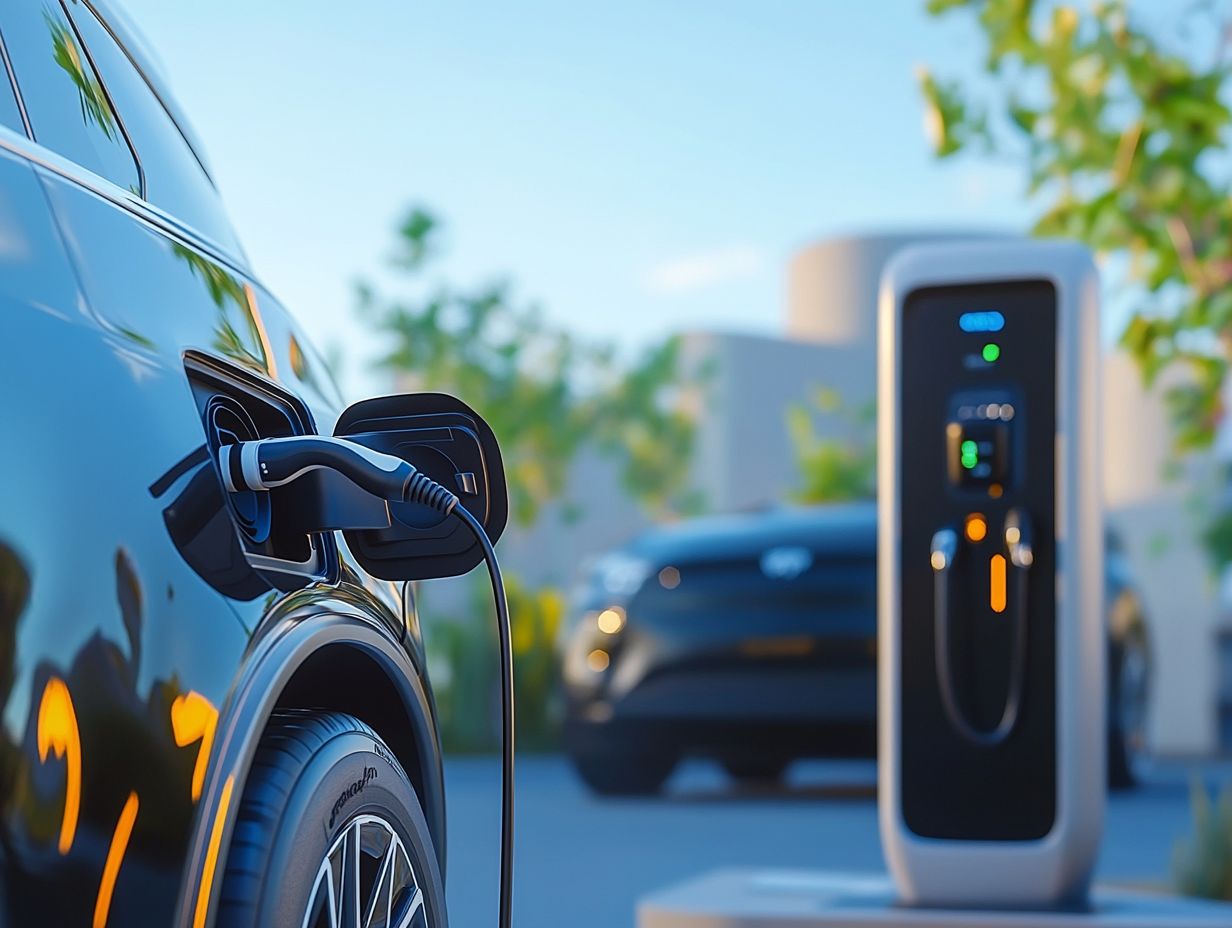
How long do electric vehicle batteries last?
The average electric vehicle battery lasts around 8-10 years or up to 200,000 miles, depending on several factors, including what is the lifespan of an EV battery.
What affects how long an electric vehicle battery lasts?
Several factors can impact how long an electric vehicle battery lasts, including the type of battery, driving habits, temperature, and maintenance.
Can you extend how long an electric vehicle battery lasts?
Yes, you can extend how long an electric vehicle battery lasts through proper maintenance and charging habits. Avoiding extreme temperatures and not fully depleting the battery can help prolong its life.
Do electric vehicle batteries need to be replaced?
Like all batteries, electric vehicle batteries eventually need to be replaced. However, with proper care and maintenance, this replacement may not be necessary for 8-10 years.
How much does it cost to replace an electric vehicle battery?
The cost to replace an electric vehicle battery can vary depending on the make and model of the vehicle, but on average, it can cost between $5,000 and $10,000.
Can an electric vehicle battery be recycled?
Yes, electric vehicle batteries can be recycled. In fact, many manufacturers have their own recycling programs to properly dispose of old batteries and repurpose their materials for future use.
Don t miss out on learning more about electric vehicles! Contact your local dealer for personalized advice.

